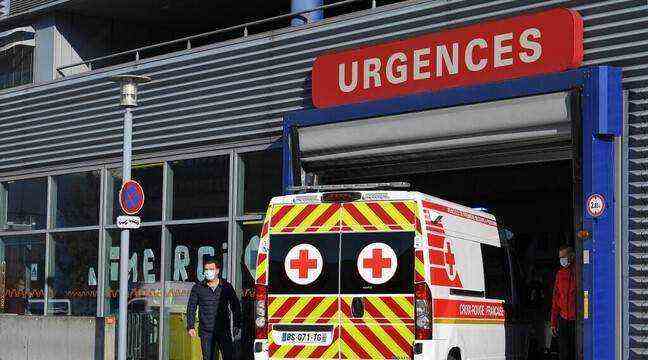The voice is white, the tone worn. With a nervous grin, Dr Céline Renfer launches this anecdote: “Despite my 35 years and my presence for more than seven years at the HUS (University Hospitals of Strasbourg), I am one of the alumni. The others left, because of the load and the working conditions. Good people, who threw in the towel … “
A medical practitioner in the HUS emergencies, she is on the front line to see her service, “the front door to the hospital”, suffer the full brunt of the shortage of human and financial resources which affects its functioning: “We are forced to publish schedules with gaps, because the medical staff is insufficient. Nurses and doctors alike, we’re at the end of our rope… ”
“We sink into the most complete indignity”
His colleague, Dr Luc Bilger, puts forward edifying figures: “Since December 1, we have counted 1,121 patients who remain on stretchers in emergency rooms for lack of beds, or an average of 28 people per day and per hospital. “
A hospital practitioner at the Hautepierre University Hospital Center (CHU), he mentions the case “of young people, aged under 40, who are forced to stand in the emergency room, while some require hospitalization. “A situation which goes up according to him” even before the Covid “:” Some people sometimes stay 48 hours on a stretcher, because there is no room in the hospital. We sink into the most complete indignity. “
“People no longer find any meaning in working for the public hospital”
The same goes for Dr Antoine Pons, anesthesiologist at the New Civil Hospital (NHC): “We cannot open all the beds in sheaves for lack of personnel. Currently, with this new Delta-Omicron wave, there is a lot of deprogramming in the operating room. The schedules of operations are reviewed from day to day. We sail by sight. “
Like his colleagues, the specialist sees “the defections” increasing: “The snowball effect continues, because people no longer find meaning in working for the public hospital. “
“Clearly a choice of society”
In the sights of Dr Bilger: the Ségur de la santé, consultation of the actors of the French healthcare system which took place between May and July 2020, and which is according to him “a vast smoke”: “The aid for health is are counted in hundreds of millions of euros, while for other sectors, it is counted in billions. I do not mind being told that there is no more money, but that they do not come and ask us for the impossible! “
Emmanuel Andrès, president of the HUS Institution Medical Commission (CME), admits: “Currently, we have 200 closed beds. We are at the end of what we can do. “For the professor of internal medicine at the CHU, whose work within the CME is done in close connection with the management of the HUS, the subject goes far beyond the framework of Strasbourg:” I expect that the candidates for the presidential election are take hold of the subject, because it is clearly a choice of society; should we invest in hospitals for the health of all? “
“The future is nursing time”
According to him, this involves strengthening the “attractiveness” of professions which are the subject of an increasingly massive exodus: “The future is nursing time. People are exhausted because their job has changed. They must be able to do what they were trained to do! “
Launched in mid-December by several Strasbourg doctors to “alert on the programmed death of the public hospital”, a symbolic minute of silence will once again be observed at the HUS this Friday. An initiative joined by the mayor of Strasbourg, Jeanne Barseghian: “No one can remain deaf to the suffering expressed by hospital staff faced with working conditions that have become unbearable. “

